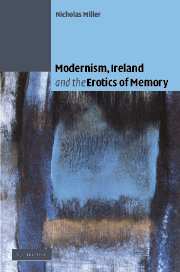Book contents
Afterword. The ends of memory and the ex-sistence of Ireland
Published online by Cambridge University Press: 22 September 2009
Summary
What has gone? How it ends? Begin to forget it. It will remember itself from every sides, with all gestures, in each our word. Today's truth, tomorrow's trend. Forget, remember !
James Joyce Finnegans WakeIn this book, as I have sketched the theoretical contours of an “erotics of memory,” I have also sought to demonstrate the risks inherent in declaring Ireland a state that might ever be “no longer” what it was. The belief in a progressive historicism, in which the past is paradoxically known and revered precisely so as to be left behind, commits Irish culture to a myopic determinism, a selective perception of the past that results in the perpetual return of its “lethal histories.” Such a historicism produces Irishness as a “dead” certainty, compensating the present for history's loss by granting it a stable, commemorative subjectivity. “To capitulate to such historicism,” as David Lloyd has argued, “rather than continually opening the historical narrative to undeveloped possibilities, is to accept the reductive logic of domination” (Lloyd, Anomalous States, 10).
The erotic discourse of memory that I have described operating in Finnegans Wake and in other sites of Irish culture displaces the “ex-” of Fintan O'Toole's “ex-isle” metaphor in an alternative direction, that of Ireland's symptomatic and erotic “ex-sistence” in Lacan's sense. Rather than a condition of perpetual temporal partition, a divide across which the present obsessively confronts a dead past, history is Ireland's modality of ex-sistence, the site of its actual ceaseless unfolding in the field of what Lacan called the Real.
- Type
- Chapter
- Information
- Modernism, Ireland and the Erotics of Memory , pp. 186 - 188Publisher: Cambridge University PressPrint publication year: 2002



